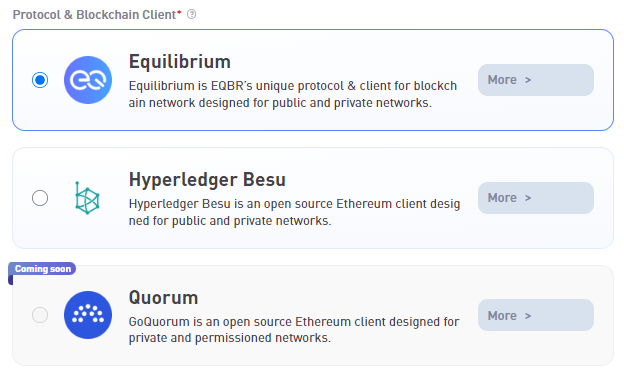Blockchain Engine(Protocol & Client)
Learn what blockchain protocol, client, and consensus algorithm is.
Blockchain Protocol
A blockchain protocol is a set of rules and standards that define how the nodes in a blockchain network communicate, validate transactions, and achieve consensus. It outlines the structure of blocks, the process of adding new blocks to the chain, and the rules for validating and confirming transactions. EQ Hub currently supports the Equilibrium and Ethereum.
| Data | Description | Example |
|---|---|---|
Equilibrium | The Equilibrium is EQBR's own blockchain engine, the operator of EQ Hub. The consensus part of the engine is made with the consensus method developed by EQBR, and the execution part of the engine is made in an EVM-compatible way | - |
Ethereum | The Ethereum protocol features a public, decentralized platform that supports smart contracts and applications, running on a blockchain technology that allows for transparent, secure, and programmable transactions without a central authority. | - |
GoQuorum | GoQuorum is a blockchain protocol specially designed for use in a private blockchain network, where there is only a single member owning all the nodes or a consortium blockchain network where multiple members each own a portion of the network | - |
Blockchain Client
A blockchain client is a software application that connects to a blockchain network and participates in the propagation and validation of transactions. Blockchain clients are essential for interacting with blockchain networks and for ensuring the integrity of the blockchain. It often referred to as a "blockchain node" or simply a "node," is a computer or device that participates in a blockchain network. EQ Hub currently supports the Equilibrium and Hyperledger Besu, and plan to add clients such as GoQuorum soon.

| Data | Description | Example |
|---|---|---|
Hyperledger Besu | Hyperledger Besu is an Ethereum client designed to be enterprise-friendly for both public and private permissioned network use cases, with an extractable EVM implementation. | - |
GoQuorum | GoQuorum is an enterprise-grade, open-source blockchain client built on the Ethereum protocol, designed for private and consortium blockchain deployments, offering features such as privacy, permissioning, and high-performance transaction processing | - |
Consensus Algorithm
A consensus algorithm is a mechanism used to achieve agreement among nodes in a distributed network, ensuring that all nodes have a consistent view of the data. In the context of blockchain, consensus is crucial for validating and confirming transactions without the need for a central authority. EQ Hub supports PBFT (Practical Byzantine Fault Tolerance) algorithm at Equilibrium, PoA (Proof of Authority) algorithm at Hyperledger Besu.
| Data | Description | Example |
|---|---|---|
PBFT (practical Byzantine Fault Tolerance) | PBFT is a consensus algorithm designed to address the Byzantine Generals' Problem in distributed systems. The Byzantine Generals' Problem refers to the challenge of reaching consensus in a network of nodes, even when some nodes may behave maliciously or fail to operate correctly. | - |
PoA (Proof of Authority) | PoA is a consensus algorithm that relies on the identity and reputation of participants to achieve agreement in a blockchain network. | - |
Updated 8 months ago
